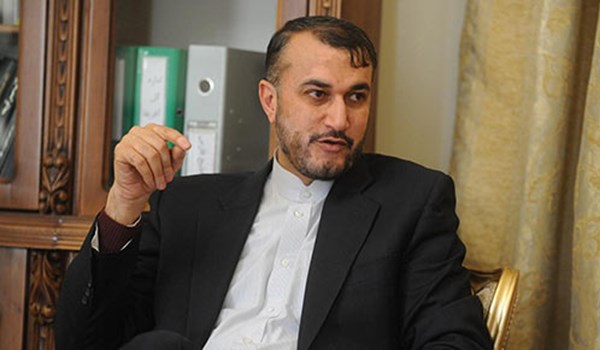
RNA - "Iran and Egypt enjoy abundant capabilities in different fields and they can use them to expand relations and help resolve the regional problems through political solutions," Amir Abdollahian said in a meeting with Head of Egypt's Interest Section Yasser Othman in Tehran on Sunday afternoon.
"Tehran's attention to Egypt's role in restoring the rights of the Palestinian people is a reminder of the necessity for the Islamic countries' confrontation against the Zionist regime's expansionist measures in the holy Quds and the West Bank and removal of the siege on the defenseless Gazans," he added, noting that the international community and the Muslim states bear a heavy responsibility in this regard.
Othman, for his part, underscored that Iran and Egypt as two great Muslim states have always made fruitful consultations at regional and international circles.
In relevant remarks in April, Supreme Leader of the Islamic Revolution Ayatollah Seyed Ali Khamenei rapped certain Islamic countries for adopting weak positions against the US and Israel.
Addressing a large number of Quran reciters and memorizers attending the 34th International Holy Quran Competitions in the Iranian capital, Tehran, Ayatollah Khamenei warned of West's attempts to gain political and economic dominance over Muslim nations.
He underlined that the Muslims worldwide should hold onto their “Islamic identity” as the main deterrence against such attempts.
The Leader described the West’s political, economic and cultural dominance as the main challenge gripping many Muslim societies today, a situation which has weakened their “Islamic identity”.
To preserve their “Islamic identity,” Ayatollah Khamenei said, Muslim nations should make efforts to get a clear understanding of “Quranic concepts” and make them an inseparable and routine part of their public and international discourse.
“We are distanced from Quran, and this is benefiting the enemies,” he added.
The Leader said staying away from the Holy Quran leads to the elimination of Islamic identity in Muslim states and the loss of this Islamic identity today is reflected in the weak stances adopted by certain Muslim countries in the face of the US and the Zionist regime of Israel.
847/940